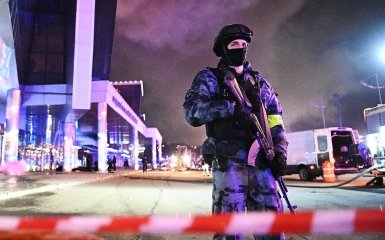Russia's propaganda starts a large-scale PsyOp campaign, the purpose of which is to "tie" Ukraine to the terrorist attack in "Crocus", in particular, in the eyes of the West.
Who does Russia use PsyOp against Ukraine regarding the terrorist attack in Moscow
The Center for Countering Disinformation (CCD) explains that the Russian Federation actively disseminates the posts of European and American journalists and bloggers who consistently promote Russian narratives, which the Center has repeatedly written about.
These are, in particular:
Italian-Swiss journalist Angelo Giuliano, who claims that the terrorist attack was committed by the "Ukrainian Nazi regime with the support of the United States." Giuliano himself lives in Hong Kong and regularly promotes clear pro-Russian messages;
American blogger Jack Posobik is a supporter of conspiracy theories and consistently promotes theses in the US that are consistent with Russian ones.
German businessman Kim Dotcom is trying to prove Ukraine's involvement in the terrorist attack through "Zelenskyy's body language". Dotcom was accused by US law enforcement officers of money laundering and fraud, and he regularly spreads pro-Russian narratives.
A terrorist attack in the suburbs of Moscow. Putin is trying to blame Ukraine baselessly
The Washington Post noted that the illegitimate president of the Russian Federation, Vladimir Putin, during a speech about the terrorist attack in "Crocus City Hall", de facto admitted the inability to prevent this incident.
In addition, it is emphasised that the dictator did not mention ISIS during his speech.
Instead, Putin used his five-minute televised address to emphasise that the four direct perpetrators were "moving towards Ukraine" when they were detained and that "a window was prepared for them from the Ukrainian side to cross the state border."
He did not directly blame Ukraine, which denied any involvement, but the reference to "Nazis" — his usual label for the Ukrainian government — made it clear that he was blaming Kyiv, the article noted.
The Ukrainian MFA chief, Dmytro Kuleba, urged to prevent attempts by Vladimir Putin and his henchmen to tie the terrorist attack in the Moscow region to Ukraine.
Putin is a pathological liar. Including now, when he is desperately trying to link Ukraine or other Western countries to the mass shooting outside Moscow, although there is no evidence to support such claims.

Dmytro Kuleya
Ukrainian MFA chief
On March 23, 133 people were killed during the terror attack in Moscow. The "Meduza" publication notes that this is the most significant terrorist attack in Russia in terms of the number of dead after Beslan. Then, in September 2004, 334 people died due to the seizure of Beslan School No. 1.




